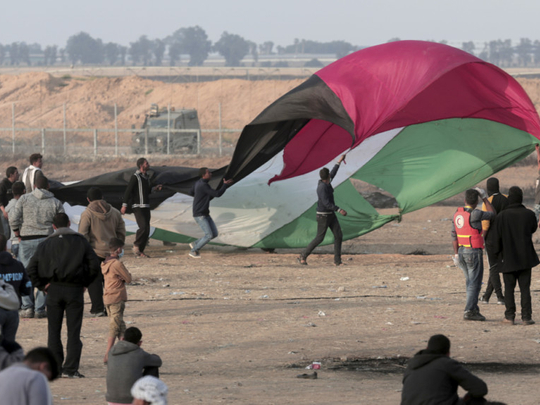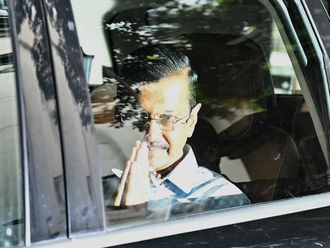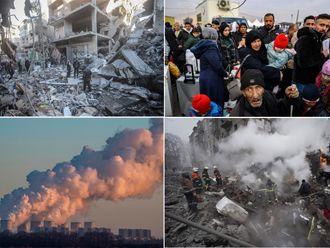
Joint Israeli-American efforts are aiming to silence Palestinian voices and empower Israeli ones, as the number of casualties of Israeli violence against peaceful protesters at the Gaza border continues to grow.
These efforts, coupled with the existing imbalance in media perceptions of Palestine and Israel, further contribute to the skewed public understanding of the situation in Palestine.
A new warfront on Palestinians has recently opened on social media, particularly on Facebook, which continues to delete accounts of Palestinian activists and media platforms. The latest notable victim of Facebook’s targeting of the Palestinian narrative on the popular social media platform was the Safa Press Agency, which had 1.3 million followers.
By removing Safa’s account late last month, Facebook had ensured that an influential news network that provided raw footage, photos and news from Palestine is stifled, to the satisfaction of Israel’s propaganda machine.
Meanwhile, the Israeli government raided and shut down a popular youth media organisation in [occupied] Jerusalem, ‘Elia for Media’, as part of its growing campaign targeting media organisations that transmit Palestinian voices, exposing Israeli atrocities, to the rest of the world.
Facebook labelled Safa Press Agency posts as ‘hate speech’, while ‘Elia for Media’ was described by the Israeli defence ministry as a “terrorist group association”.
During the March for Freedom at the Gaza border, several Palestinian journalists have been shot and killed, the latest victim being Ahmad Abu Hussain, 25, who succumbed to wounds he sustained on April 13. This ongoing war on Palestinian media, however, is part of a larger attack that requires some contextualisation. Western media’s relationship with the subject of Palestine and Israel has been marred by inaccuracies, false perceptions and incongruities. Western mainstream media is failing, not just because of the pro-Israel attitude held by most Americans and, to a lesser degree, of Europeans, but also because of their sheer ignorance of the uncontested facts. For example, an IRmep poll fielded by Google Consumer Surveys, concluded two years ago that majority of Americans were under the misconception that Palestinians occupy Israeli land, instead of the other way around. This dangerous lack of knowledge, considering the amount of time spent discussing Israel on American television channels and in newspapers, is indicative of a media failure. It has created an intellectual vacuum that has perpetuated such twisted ideas as ‘Palestinian mothers hate their children’ for far too long.
Alas, the above line was, in fact, a media staple on prominent American TV networks during the Second Palestinian intifada between 2000-2005. Such dark judgement was not founded on any rational claim to support it, but on Zionist ideals of the past. The term ‘media bias’ does not do justice to western media’s relationship with Israel and Palestine. The relationship is, indeed, far more profound than mere partiality. It is not ignorance, either. It is a calculated and long-term campaign, aimed at guarding Israel and demonising Palestinians.
Political symbiosis, cultural affinity, Hollywood propaganda and the far-reaching influence of pro-Israel and Zionist groups within the political and media circles are some of the explanations that many of us have offered as to why Israel is often viewed with sympathetic eyes, and Palestinians and Arabs condemned. But such explanations should hardly suffice. Palestinian and Arab journalists, intellectuals and cultural representatives are more present on a global stage than ever before and are more than capable of facing off, if not defeating, the pro-Israeli media discourse.
However, they are largely invisible to western media; it is the Israeli spokesperson who continues to occupy the centre stage, speaking, shouting, theorising and demonising as he pleases. It is, then, not a matter of media ignorance, but of media policy.
The current disgraceful coverage of Gaza’s popular protests indicates that the media’s position aims at suppressing the truth on Palestine, at any cost and by any means. Even before March 30, when scores of Palestinians in Gaza were killed and thousands wounded at the Gaza border, the United States and British media, for example, should have, at least, questioned why hundreds of Israeli snipers and army tanks were deployed at the border area to face-off Palestinian protesters. Instead, the media referred to “clashes” between Gaza youth and Israeli snipers as if referring to equal forces in an equivalent battle.
The maxim that official Israeli propaganda or ‘hasbara’ is too savvy no longer suffices. In fact, this is hardly true.
Where is the ingenuity in the way the Israeli army explained the killing of unarmed Palestinians in Gaza?
“Yesterday we saw 30,000 people,” the Israeli army tweeted on March 31. “We arrived prepared and with precise reinforcements. Nothing was carried out uncontrolled; everything was accurate and measured, and we know where every bullet landed.”
Israel’s ultra-nationalist Minister of Defence Avigdor Lieberman followed that self-indictment by declaring that there are “no innocent people in Gaza”, thus legitimising the targeting of any Gazan within the besieged Strip.
Biased media coverage is not fuelled by the simplistic notion of ‘clever Israel, imprudent Arabs’. Western media is actively involved in shielding Israel and enhancing its diminishing brand, while painstakingly demolishing the image of Israel’s enemies. Israel’s media apparatus is as erratic and self-defeating as North Korea’s; but this is hardly the image conveyed by western media, which insists on placing Israel on a moral pedestal while misrepresenting Palestinians, regardless of the circumstances.
Media spin will continue to provide Israel with the needed margins to carry out its violent policies against Palestinian people, with no moral accountability. It will remain loyal to Israel, creating a buffer between the truth and its audiences. It is incumbent upon us to expose this sinister relationship and hold mainstream media accountable for covering up Israel’s crimes, as well as Israel, for committing and perpetuating these crimes in the first place.
Ramzy Baroud is a journalist, author and editor of Palestine Chronicle. His latest book is The Last Earth: A Palestinian Story (Pluto Press, London, 2018).



_resources1_16a45059ca3_small.jpg)






